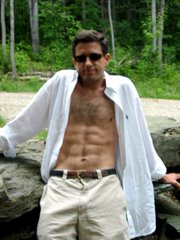Autistic hiker back with family in W.Va.
By VICKI SMITH and KELLEY SCHOONOVER, Associated Press WritersFri Oct 19, 10:17 AM ET
An autistic teen found underneath an umbrella of dense brush after four days in the wilderness was doing well at a hospital Friday, asking for food and smiling at relatives who came to visit him, his family said.
Jacob Allen, 18, was discovered Thursday sleeping under a thicket of laurel in the Dolly Sods Wilderness Area, part of the Monongahela National Forest. He had survived four cold days and four nearly freezing nights.
His mother, Karen Allen, spent the night in the hospital, keeping watch over her son.
"He was alert, asking for food and wanted to get out of bed and walk around," she told NBC's "Today" on Friday.
It was the wilderness — a cascade of mountain laurel and rhododendron flowing over loose rock and steep cliffs — that posed the greatest danger to Allen while he was lost. But in the end, it was the one thing that kept him safe.
Though Allen was less than a mile from the spot where searchers had found his hat Monday, the brush kept his location hidden until Thursday afternoon. State Police 1st Sgt. Jim Wise said he believes it also may have kept the teen from wandering toward 20- to 30-foot cliffs.
"It made sort of like an umbrella, but underneath it was bare and open," Wise said. "It made some type of shelter."
Allen opened his eyes, then rolled over to meet his rescuers when Jeremy Reneau called his name.
"He was very quiet," said Reneau, 25, the first to spot Allen. "But you could tell by his body language he was hungry."
After a quick meal of candy bars and peanut butter sandwiches, Allen tried to walk with rescuers but tired quickly. Reneau, Wise and others carried him on a litter to a trailhead where 50 people, including his parents, awaited.
"There were tears. There was clapping. I was crying. Other people were crying," said Tiffany Curran, a volunteer firefighter.
Allen was in good condition at Davis Memorial Hospital in Elkins, where officials said he remained under observation. His parents, 14-year-old brother, Micah, and 22-year-old sister, Brittany, were with him.
"We are just relieved and just so happy, happier than in the past couple days, that's for sure," Micah Allen said Friday morning.
He said that even though his brother is nonverbal, "he's obviously 10 times happier. You can tell he's happy to be with us, he's smiling when we walk into the room."
Micah Allen said he expected his brother to be released from the hospital Friday.
Jacob Allen wandered away from his parents Sunday afternoon on the Boar's Nest Trail in Randolph County. Hundreds of volunteers and trained professionals had been combing the woods, calling for him to come to them for candy bars, ice cream and other food. After each shout, they listened closely for rustling brush.
Overnight temperatures dropped to as low as 38 degrees the first night Jacob Allen was in the woods, wearing only a wind jacket and wind pants over his T-shirt and hiking boots. However, rescuers said hypothermia was not a concern as long as he stayed dry. Some scattered showers hit the region over the four-day period, but the search area remained dry and temperatures slowly began to rise.
"Every day, it just got warmer and warmer and warmer," Karen Allen told "Today." "It was like God breathed some warm breath on us here in the mountains."
___
Schoonover reported from Charleston. Associated Press writers Tom Breen and April Vitello in Charleston also contributed to this report.
And this seems really interesting. Gonna work? I don't know. But I'm hoping ...
OFF MESSAGE Deep Dive
By William Powers, National Journal© National Journal Group Inc.Friday, Oct. 19, 2007
Some good news about the media has actually been making headlines. When was the last time that happened? 1974?
The bombshell is ProPublica, a brand-new investigative journalism outfit to be launched in January by one of the most respected figures in the newspaper business, longtime Wall Street Journal Managing Editor Paul Steiger.
Steiger will be able to hire top-flight investigative reporters who know how to do the 'deep-dive stuff,' as he puts it, that has real impact.
While ProPublica will be a nonprofit, it's backed by serious money: $10 million a year for at least three years from principal funders Herbert and Marion Sandler, California savings and loan billionaires. This means that Steiger will be able to hire top-flight investigative reporters who know how to do the "deep-dive stuff," as he puts it, that has real impact.
Culturally, Steiger is a bit of a throwback to the days when journalism was more of a righteous crusade. In an interview, he talked to me about his desire to drill into not just government and business but "any center of power," including unions, the media, lawyers, universities, and school systems.
ProPublica's website describes its mission this way: "We will do this by producing journalism that shines a light on exploitation of the weak by the strong and on the failures of those with power to vindicate the trust placed in them."
When I asked if there were any Wall Street Journal investigations he oversaw that might serve as a model for ProPublica, Steiger cited the paper's 2006 expose about the backdating of executive stock options, which won a Pulitzer Prize. Those stories "reminded people in positions of corporate power that when they abuse that power they can go to jail, or at least suffer public opprobrium, and that's what we should be doing."
He will be hiring two dozen staffers, which doesn't sound like a lot until you consider what a rare beast the investigative journalist is. The website cites a 2005 survey by Arizona State University showing that of the 100 largest daily newspapers in the United States, a majority had two or fewer full-time investigative reporters, while just 10 percent had four or more. The reason is pure economics: Hard-core investigative journalism is time-consuming and costly, and often the first budget item to be cut.
In addition to publishing stories on its own website, ProPublica plans to offer its work to mainstream news outlets -- for free. This is not a new concept: Other nonprofit news operations, such as the Pulitzer Center on Crisis Reporting in Washington, shop their work to larger outlets. But nobody has ever done it with an annual budget of $10 million. Within a day of his big announcement, Steiger had heard privately from mainstream news execs interested in publishing or broadcasting ProPublica's work. "There were, like, eight or nine people, and not the Plattsburgh Daily Bugle, either."
Ambitious investigations are tricky enough when done by in-house reporters, and this would add a new layer of complexity. If all goes well, both parties will have something to gain: For the client outlet, groundbreaking work at no cost; for ProPublica, wider exposure. "And we always have the fallback of just putting [stories] up on our website," Steiger says. "It's not like if the editor of The New Yorker won't take this, we're toast."
I asked if anything is lost when you remove the profit motive from news. "One of the things the marketplace does is challenge you to perform. And here we are, we don't have to get circulation revenues and we don't have to get advertising revenues," he said. "On the one hand, it's liberating; on the other, it could be a curse. I feel an enormous challenge and an enormous responsibility to make this successful, and I'm going to try and recruit people who share that passion."
The passion, or at least a fascination with this novel concept, appears to be out there. A New York Times article on the venture was among the top 10 most e-mailed articles on the Times website earlier this week. ProPublica even made The Drudge Report.
"I think they're going to think of themselves as kind of the Green Berets of journalism," says John Carroll, former editor of the Los Angeles Times. "I think it will have a lot more energy than your normal journalistic operation. If it doesn't, it will sink like a stone."
-- William Powers is a columnist for National Journal magazine, where "Off Message" appears. His e-mail address is bpowers@nationaljournal.com.
Leaves are at peak. And, I got my second egg the other day! Translated: It's good to be off the road for a while. I spent exactly seven hours in Washington; just about right. It was 80 degrees and crowded. It is not 80 degrees here, and it is definitely not crowded.
Finally: Got a post wondering if I'm still training. Eh. Not so much. A little here, a little there. I'm waiting on two things to happen, the most important of which is my shoulder. Torn rotator cuffs will make you lazy. I need to get it fixed, and soon. Oddly enough, when I was in Washington, everyone told me I look really skinny, which isn't my usual condition (unless I'm working out heavily). So I guess I'm doing just enough to keep from becoming a blimp.












No comments:
Post a Comment